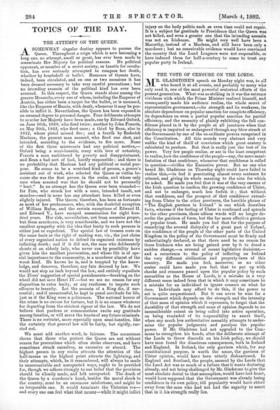TOPICS OF THE DAY.
THE ATTEMPT ON THE QUEEN.
ASOMEWHAT singular destiny appears to pursue the Queen. Throughout a reign which is now becoming a long one, no attempt, small or great, has ever been made to assassinate Her Majesty for political reasons. No political opponent, or member of a secret society, or fanatic for revolu- tion, has ever seriously attempted to compass her death, whether by bombshell or bullet. Rumours of threats have, indeed, been circulated, and on one or two occasions it has been deemed necessary to take very careful precautions ; but no intending assassin of the political kind has ever been arrested. In this respect, the Queen stands alone among the greater Monarchs, every one of whom, including the Emperor of Austria, has either been a target for the bullet, or is menaced, like the Emperor of Russia, with death, whenever it may be pos- sible to inflict it. Nevertheless, the Queen has been exposed in an unusual degree to personal danger. Four deliberate attempts to murder her Majesty have been made, one by Edward Oxford, on June 10th, 1840, who fired twice; another by John Francis, on May 30th, 1842, who fired once; a third by Bean, also in 1842, whose pistol missed fire ; and a fourth by Roderick Maclean, the present man accused, who fired one shot, and intended, according to the evidence, to fire more. None of the first three miscreants had any political motive,— Oxford being a semi-lunatic, crazy with love of notoriety, Francis a man embittered by poverty and disappointment, and Bean a bad sort of fool, hardly responsible ; and there is no probability that Maclean had any political or social pur- pose. He seems to be a wretched kind of person, a grocer's assistant out of work, who selected the Queen as victim be- cause she was the first person in the realm, and whose only care when arrested was that he should not be personally " hurt." In no attempt has the Queen ever been wounded— for Pate, who struck her with a cane, intended insult, not murder—and in none has any attendant been killed or even slightly. injured. The Queen, therefore, has been as fortunate as most of her predecessors, who, with the doubtful exception of William Rufus, and the certain exceptions of Edward II. and Edward V., have escaped assassination for eight hun-. dred years. Her risk, nevertheless, not from assassins proper, but from murderers, is very considerable, and we have not the smallest sympathy with the idea that lenity to such persons is either just or expedient. The special law of treason rests on the same basis as the right of making war, viz., the just claim of every organised nation to defend its organised existence by inflicting death ; and if it did not, the man who deliberately shoots at an elderly lady, who never can by possibility have given him the smallest provocation, and whose life is of spe- cial importance to the community, is a murderer almost of the worst kind. He knows he is, and is tempted by the know- ledge, and deserves, therefore, any fate decreed by law. We would not step an inch beyond the law, and entirely repudiate the Times' suggestion of special punishments—breaking on the wheel did not save Henri IV.—but we see no reason for any disposition to extra lenity, or any readiness to impute such offences to insanity. Let the assassin of a King die, if suc- cessful; and if unsuccessful, be kept in penal servitude for life, just as if the King were a policeman. The national horror of the crime is no excuse for torture, but it is no reason whatever for departing from the strictest rigour of the law. We do not believe that pardons or commutations excite any gratitude among fanatics, or will move the hearts of any future criminals. There is no restraint, more especially upon semi-lunatics, like the certainty that general law will be fairly, but rigidly, car- ried out.
We must add another word, in fairness. The occurrence shows that those who protect the Queen are not without reason for precautions which often strike observers, and have sometimes struck ourselves, as excessive or absurd. The highest person in any realm attracts the attention of the half-insane as the highest point attracts the lightning, and their attempts, which, be it remembered, will always be made in unaccountable and unexpected ways, ought to be provided for, though we adhere strongly to our belief that the provision should be silently made, and left unreported. The death of the Queen by a murderer's hand, besides the moral shock to the country, must be an enormous misfortune, and might be an irreparable one. It would terminate the Victorian era— and every vas can feel what that means—while it might inflict injury on the body politic such as even time could not repair. It is a subject for gratitude to Providence that the Queen was not killed, and even a greater one that the intending assassin was not an Irishman. He might very well have been a Macarthy, instead of a Maclean, and still have been only a murderer ; but no conceivable evidence would have convinced the country that the Land Leaguers were not responsible, or have induced them for half-a-century to come to trust any popular party in Irelartd.


































 Previous page
Previous page